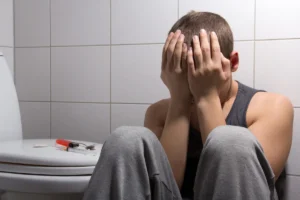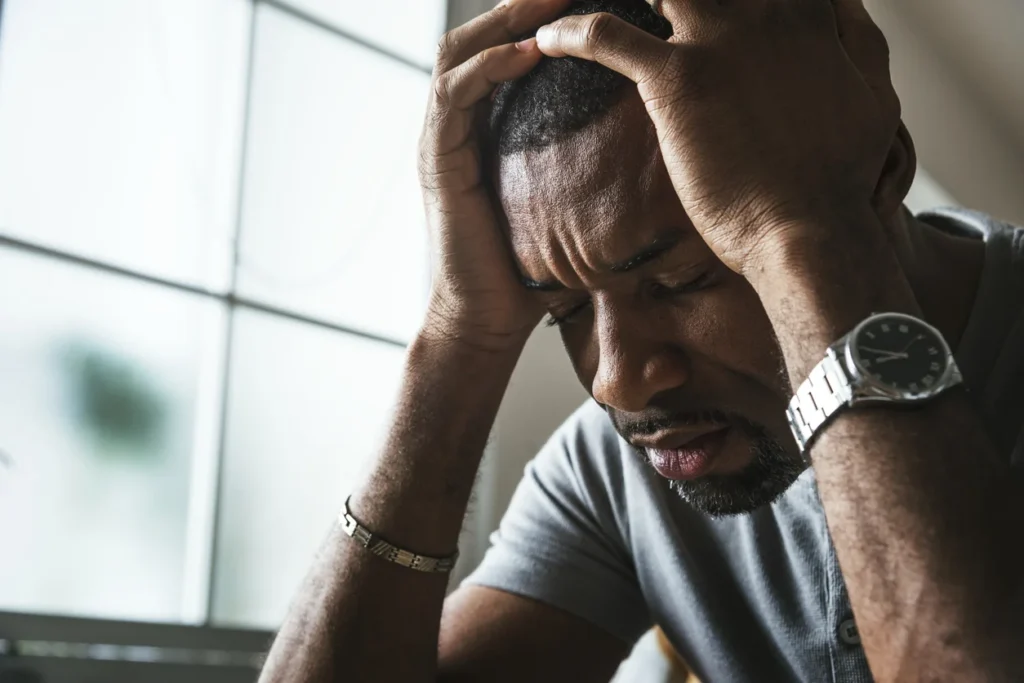Relapse is a word that often brings anxiety to anyone recovering from addiction. It’s a real challenge, but it’s also a normal part of the recovery journey. Understanding that relapse doesn’t mean failure is crucial. It’s just another obstacle to overcome.
In this blog, we’ll explore what a relapse is, look at its different stages, and share some practical strategies to both prevent and manage it. We’ll guide you through identifying triggers, creating a solid plan to avoid relapse, and finding the best treatments if it happens. So, let’s get started and explore the tools and confidence needed to face and overcome this challenge.
Contents
Understanding Addiction Relapse
 Addiction relapse is often misunderstood as a single failure or a moment of weakness, but it’s important to recognize that it is actually a process and a common part of the recovery journey for many. Understanding this can change how individuals and their support networks approach recovery and relapse.
Addiction relapse is often misunderstood as a single failure or a moment of weakness, but it’s important to recognize that it is actually a process and a common part of the recovery journey for many. Understanding this can change how individuals and their support networks approach recovery and relapse.
What is a Relapse?
- Relapse in addiction is the return to substance use after an attempt to stop. The process of relapse can begin weeks or even months before the actual physical act of using the substance again.
- The Process
Relapse typically follows a progression that starts long before the use of a drug or alcohol. It begins in the mind with emotional and mental battles before it manifests physically. This progression is divided into three stages: emotional, mental, and physical relapse.
Recognizing Relapse as Part of Recovery:
- A Common Challenge
Relapse is not uncommon; many people experience relapse at some point during their recovery. Recognizing that relapse can happen to anyone and is often part of the process helps in managing expectations and planning for recovery.
Understanding that relapse is a process and not just an event helps in recognizing the early signs and taking preventive actions. It emphasizes the need for continuous support and proactive strategies in the journey of recovery, reducing the stigma associated with relapse and encouraging a more supportive approach from peers and the community.
The Stages of Relapse

Relapse is not a sudden event but a gradual process that can be broken down into three distinct stages: emotional, mental, and physical. Understanding these stages can help individuals and their support networks recognize early warning signs and intervene before a full relapse occurs.
Emotional Relapse
- Characteristics: During the emotional stage, individuals are not actively thinking about using again, but their emotions and behaviors may be setting them up for a possible relapse. Common signs include anxiety, irritability, mood swings, and not managing stress effectively.
- Prevention: Recognizing these emotional cues is crucial. Effective stress management techniques, regular engagement in support groups, and therapy can help manage these emotions. Maintaining a healthy lifestyle with adequate sleep, nutrition, and exercise is also vital.
Mental Relapse
- Characteristics: In the mental relapse stage, the individual starts to think about using again. They may romanticize past drug use or begin bargaining (e.g., thinking they can control usage this time). Cravings become stronger, and the person might start lying or hiding their feelings from others.
- Prevention: Strong coping strategies are necessary to combat mental relapse. This includes distraction techniques, speaking to a counselor or a support group, and reminding oneself of the negative consequences of past substance use. Cognitive behavioral therapy is particularly useful in managing thought patterns that contribute to relapse.
Physical Relapse
- Characteristics: Physical relapse is the stage where the individual actually starts using the substance again. Once the action has been taken, it can be challenging to stop the process.
- Prevention: The key to preventing physical relapse lies in addressing the earlier stages effectively. However, if signs point to an imminent relapse, immediate intervention from healthcare professionals or a trusted support network is critical. This might involve entering a rehab facility or adjusting treatment medications and strategies.
Understanding these stages highlights the importance of early intervention and continuous support. By recognizing the early signs in the emotional and mental stages, individuals and their support teams can implement strategies to prevent the situation from escalating to physical relapse. This proactive approach is crucial in maintaining long-term recovery.
Triggers and Warning Signs of Addiction Relapse
 Recognizing the triggers and early warning signs of relapse is crucial for maintaining long-term recovery. These signs can vary from person to person but generally include a combination of external triggers and internal emotional or cognitive changes. Identifying these early can help prevent a full relapse by enabling timely intervention.
Recognizing the triggers and early warning signs of relapse is crucial for maintaining long-term recovery. These signs can vary from person to person but generally include a combination of external triggers and internal emotional or cognitive changes. Identifying these early can help prevent a full relapse by enabling timely intervention.
Common Triggers:
- Environmental Triggers: Places, people, or activities associated with past substance use can reignite cravings. Social situations where drugs or alcohol are present can also tempt a return to old habits.
- Emotional Triggers: Stress, anxiety, loneliness, sadness, or even extreme happiness can trigger relapse. Emotional triggers are particularly challenging because they can create a perceived need to escape or enhance feelings through substance use.
- Physical Triggers: Physical pain or discomfort can also lead to relapse, especially if substances were previously used as a form of self-medication.
Warning Signs:
- Change in Attitude or Behavior: A noticeable shift in one’s outlook on recovery, such as expressing negativity towards treatment or support groups, can be a precursor to relapse.
- Increased Isolation: Pulling away from support networks and social withdrawal are significant red flags. Isolation can be both a sign and a cause of impending relapse.
- Poor Self-Care: Neglecting personal hygiene, sleep, or nutrition can indicate a decrease in self-regulation and coping skills.
- Romanticizing Past Use: Individuals may start to recall their substance use days with nostalgia, minimizing the negatives and remembering only the perceived positives.
- Sudden Changes in Routine: Abandoning routines that support recovery, like regular meetings or therapy sessions, can indicate a weakening commitment to sobriety.
- Defensiveness: Becoming defensive or angry when someone mentions their behavior or substance use can be a sign of internal conflict about relapsing.
Coping Strategies to Prevent Addiction Relapse
Preventing relapse is an ongoing process that requires a combination of personal strategies and external support. Here are practical tips on how to manage triggers and maintain sobriety:
- Mindfulness and Meditation
- Regular Exercise
- Healthy Sleep Habits
- Balanced Diet
- Regular Therapy Sessions
- Identify Personal Triggers
- Develop Avoidance Strategies
- Have an Escape Plan
By incorporating these strategies into your daily life, you can build a strong foundation for sustained recovery and significantly reduce the risk of relapse. Each strategy helps create a buffer against the pressures and temptations that challenge sobriety, reinforcing your commitment to a healthier, substance-free life.
Treatment Options After Relapse
Experiencing a relapse can be disheartening, but it’s important to view it not as a failure but as an opportunity to reassess and strengthen your recovery plan. Reacting promptly and effectively after a relapse is crucial in preventing further setbacks. Here are some treatment options and strategies to consider if relapse occurs:
Immediate Response and Assessment:
- Seek Immediate Support: Contact a therapist, counselor, or a trusted support person as soon as you recognize a relapse. The quicker you address the slip, the less likely it will escalate into a more severe return to old behaviors.
- Evaluate the Circumstances: Review what led to the relapse, including identifying specific triggers and assessing whether your current coping strategies were effective or need adjustments.
Adjusting Treatment Plans:
- Intensify Treatment Frequency: If you were gradually reducing therapy sessions or support group meetings, it might be necessary to increase them again temporarily to reinforce your recovery.
- Modify Therapeutic Approaches: Discuss with your healthcare provider whether incorporating or changing therapeutic techniques could be beneficial. For instance, adding cognitive-behavioral therapy (CBT) to address specific triggers or exploring medication-assisted treatment (MAT) to manage cravings.
Revisiting and Strengthening Coping Strategies:
- Enhance Relapse Prevention Strategies: Work with your therapist to develop a more robust relapse prevention plan. This might include more detailed strategies for dealing with high-risk situations and stronger support mechanisms.
- Strengthen Your Support Network: Ensure that you have a solid support system in place. This could mean more regular check-ins with a sponsor or more active participation in community support groups.
Long-term Recovery Maintenance:
- Ongoing Therapy and Support: Continuous engagement in therapy and support groups is crucial, even after you feel stable in your recovery. Ongoing treatment helps address underlying issues that contribute to addiction and provides continuous support to prevent future relapses.
- Lifestyle Adjustments: Sometimes, making broader lifestyle changes, such as changing social circles, altering daily routines, or even changing your living environment, can provide a fresh perspective and remove old cues associated with substance use.
Viewing relapse as a learning opportunity allows individuals to refine their recovery strategy and come back stronger. With the right adjustments and a positive mindset, relapse can be a stepping stone to a more resilient and sustainable recovery.
The Role of Therapy and Counseling

Therapy and counseling are pivotal elements in both preventing relapse and supporting recovery after a relapse has occurred. Here’s how ongoing therapy and counseling can play a transformative role in the journey of recovery:
- Regular sessions with a therapist or counselor offer ongoing support, helping individuals navigate the daily challenges and stresses that can lead to relapse. T
- Therapy, especially cognitive-behavioral therapy (CBT), is essential for developing coping skills that directly impact an individual’s ability to prevent relapse.
- CBT teaches individuals to identify and reframe negative thought patterns, develop healthier responses to stress, and effectively manage triggers and cravings.
- Counselors work with individuals to create tailored relapse prevention plans.
- Therapy helps individuals recognize and understand the personal and environmental triggers that might jeopardize their recovery.
Therapy and counseling are indispensable in the addiction recovery process, offering essential tools, emotional support, and a framework for understanding and overcoming the challenges associated with addiction and relapse. By regularly engaging in therapy, individuals are better equipped to maintain their sobriety and build a resilient foundation for their long-term recovery.
Conclusion
Dealing with a relapse can be a challenging and disheartening experience, but it’s important to remember that it’s a common part of the recovery journey. You’re not alone in this struggle, and relapse doesn’t mean failure. Instead, it’s an opportunity to learn, grow, and strengthen your commitment to recovery.
At QuitMantra, we understand the complexities of relapse and the importance of having a supportive and understanding environment to navigate this phase. Our dedicated team is here to provide you with the necessary tools, counseling, and support to help you regain your footing and continue on your path to recovery.
We invite you to visit our website and explore how our tailored therapy sessions and comprehensive deaddiction programs can assist you. Book your trial therapy session or join our deaddiction program today, and take a positive step towards overcoming the challenges of relapse.
